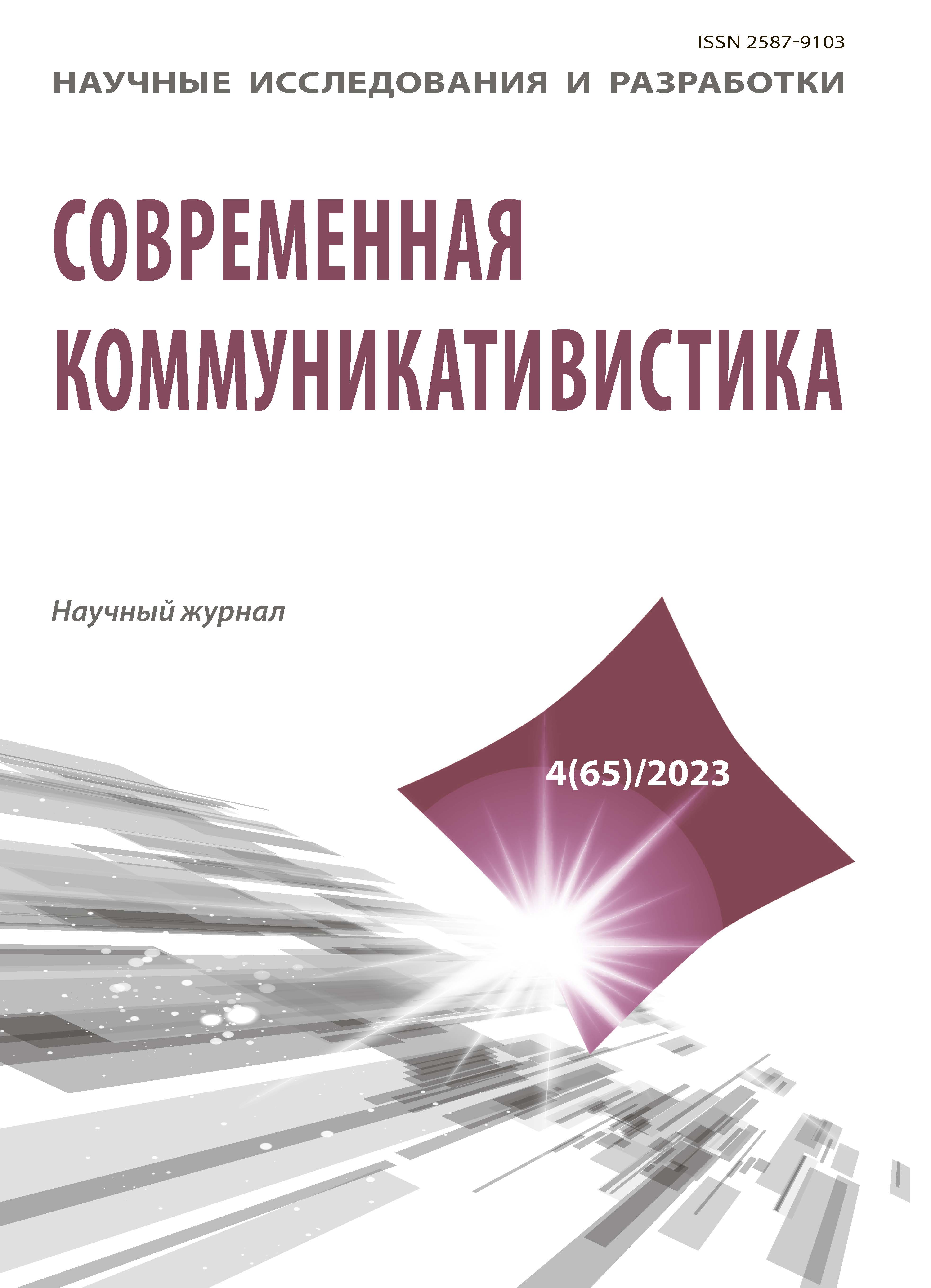Volgograd, Volgograd, Russian Federation
UDC 81
The object of the study is the actual socionyms functioning in the Russian-language Internet communication in 2000-2022. They reflect identities, characteristics that become the basis for the delimitation of the social space of society. The analysis includes semantic, motivological, word-formation analysis of socionyms, characterization of their usage, including usage in semantic formulas correlated with the dictionary of identity / characterization dictionary, determination of the tendency of socionyms to contexts with a certain sentiment. At the same time, a significant (down to zero marks) decrease in the frequency of analyzed socionyms in Russian-language Internet communication should be noted since February 2022. It is shown that socionyms function in formulas of identifying (self) definition, optionally in formulas of identifying spatial, event-related community. The described units refer mainly to the characterization dictionary, reflecting the stigmatization of groups based on individual socially significant properties (status-role, local, sociocultural) of subjects. The relevant parameters of group stigmatization expressed in the internal form of socionyms: “center” - “periphery” / “friends - newcomers”; “material well-being and its possible opportunities”, “values, goals and lifestyle” are determined. Significant dichotomies of semantic features in the meaning of the described socionyms are singled out, lexicalization of abbreviations, borrowing and shortening of words are determined as relevant types of word formation. The conjugation of most of the studied socionyms with contexts with negative tonality has been established. The signs associated with the denotation and reflected in the contexts of the functioning of socionyms are characterized.
Internet communication, socionyms, characteristics of word formation, semantic and motivational characteristics, functional characteristics.
1. Belyaeva A. How to live on a living wage in 2018: an experiment by a Komsomolka correspondent // Komsomol truth. 27.02.2018. URL: https://www.stav.kp.ru/daily/26799/3835009/.
2. Bobrova I. The outside world is hell": how Russian recluse-Hikki live // MK.RU. 14.07.2016. URL: https://www.mk.ru/social/2016/07/14/vneshniy-mir-eto-ad-kak-zhivut-rossiyskie-zatvornikikhikki.html.
3. Gapeenkova M.Yu., Rotanova M.B. Creative communication: breaking a template or a template? // Nauchnye issledovaniya i razrabotki. Sovremennaya kommunikativistika [Scientific Research and Development. Modern Communication Studies], 2021, vol. 10, no. 2. pp. 81-86. DOIhttps://doi.org/10.12737/2587-9103-2021-10-2-81-86.
4. Garagulya, S. I. Anthroponymic pragmatics and the identity of the individual: abstract of the thesis of a doctor of philological sciences. 2009. Moscow: Moscow State University M. V. Lomonosov, 42 p.
5. Is there a hiki here? // Forum about Sociophobia. 25.06.2012. URL: https://sociophobia.ru/viewtopic.php?id=1235.
6. Efremova T.F. (). New explanatory and derivational dictionary of the Russian language. In 3 B. Moscow : AST. 2008. 976 p. ISBN 5-17-013734-6. URL: http://dic.academic.ru/contents.nsf/efremova/.
7. Magazine about son and Japanese life. // Live Journal. Jey-ka. 02.02.2014. URL: https://jey-ka.livejournal.com/tag.
8. Zavadskaya A.V. Outrage as a characteristic feature of digital media // Nauchnye issledovaniya i razrabotki. Sovremennaya kommunikativistika [Scientific Research and Development. Modern Communication Studies], 2021, vol. 10, no. 2, pp. 87-92. DOIhttps://doi.org/10.12737/2587-9103-2021-10-2-87-92.
9. Zaripova V.M. The nomination of persons in the language of the newspaper: the evolution of etiquette trends. Samara: SSAU publishing house. 2016. 180 p. ISBN 978-5-7883-1065-7.
10. Krasnodar - the opinion and attitude - of the ponaech (newcomer) to the ponaech (newcomer) and local residents // Dzen.ru. 19.08.2021. URL: https://zen.yandex.ru/media/id/600c7ea0e73f7535004683ae/krasnodar-mnenie-i-otnoshenie-ponaeha-k-ponaeham-i-mestnym-jiteliam-611e3eb1e134254500c57ed4.
11. The Red Commissar. Pensioners, minimum wage workers // VKontakte, 26.12.2020. URL: https://vk.com/wall-60932039_940175?ysclid=lhnex15li833106018.
12. Kustarev A.S. Nervous people: essays on the intelligentsia. Moscow: Association of Scientific Publications KMK. 2006. 374 p. ISBN 5-87317-275-7.
13. Leontyeva T.V., Shchetinina A.V. Dictionary of actual vocabulary of unity and enmity in the Russian of the early XXI century. Yekaterinburg: Azhur, 2021. 424 p. ISBN 978-5-91256-535-9.
14. Lappo M.A. Self-identification: semantics, pragmatics, language resources. Novosibirsk: Publishing House of the Novosibirsk State Pedagogical University, 2013. 180 p. ISBN 978-5-85921-977-3.
15. Mizziti, F. Thematic classification and linguistic and cultural characteristics of periphrastic socionyms. Advances in the Humanities, 2019, no. 7, pp. 299-304.
16. Mizziti, F. Productive thematic groups of periphrases (socionyms, toponyms, cultural names) of the Russian language in the linguoculturological aspect (against the background of the Chinese language). Abstract of the dissertation of the candidate of philological sciences. St. Petersburg, 2020. 25 p.
17. Morozova E. V. (). Dehumanization as a technology for forming the image of the Other / Alien in politics. Central Russian Bulletin of Social Sciences. Series: Political Science, 2015, no. 10 (6), pp. 121-128. DOI:https://doi.org/10.12737/16971.
18. Nebozhena. About freaks and people // VKontakte. 16.04.2021. URL: https://vk.com/wall-186187283_12502?ysclid=lhnel6g3i5238055049.
19. NCRL. National corpus of the Russian language URL: https://ruscorpora.ru/ (accessed: 25.02.2022).
20. Novikova, E. Yu. Structure, semantics and trends in the development of names of persons by profession in modern German. Abstract of the dissertation of a candidate of philological sciences. Moscow, 2006, 25 p.
21. Porhun L. Leave me alone // Dzen.ru, 15.01.2021. URL: https://zen.yandex.ru/media/id/5e426b964794a43797944d8c/ostavte-menia-v-pokoe-600180c7d0d4386c9ff38eaf.
22. Rebrina, L. N. Semantic and Motivational Characteristics of Neolexemes of Enmity: Discursive Disclosure of Inner Form of the Word. Nauchnyi dialog, 2020, no. 8, pp. 141-155. DOI:https://doi.org/10.24224/2227-1295-2020-8-141-155.
23. Sakhalin news. Readers' Forum. 01.12.2016. URL: https://forum.sakh.com/1589932/.
24. Solovieva, M. A. Nouns - nominations of persons by profession and occupation in the Russian language of the XXI century. Abstract of the dissertation of a candidate of philological sciences. Velikiy Novgorod: Vladimir State University, 2018, 22 pp. (In Russ.)
25. Sheudzhen F.Yu. Studied history and fell in love // Kuban AiF newspaper, 07.11.2020. URL: https://kuban.aif.ru/society/izuchil_istoriyu_i_vlyubilsya_o_chyom_gid_rasskazyvaet_turistam_v_krasnodare.
26. Alcoff L. M. Visible identities: Race, gender, and the self. Oxford: Oxford University Press. 2005. 326 p. ISBN-10 : 0195137353.
27. Eureka Engine. Module of automatic Language Detection. URL: http://eurekaengine.ru/ru/demo/.
28. Eva.ru. What irritates you in ponaech? Why so much snobbery?. 10.01.2022. URL: https://eva.ru/beauty/messages-3553074.htm?.
29. GBNV Google Books Ngram Viewer URL: https://books.google.com/ngrams/graph.
30. Lammert M. Collective human names in French: semantic, lexical and discursive issues // Journal of French language studies, 2021, no. 31(1), pp. 118-120.
31. Lecolle M. Plurality and its Nominal Wording. La France, les Francais, le peuple francais: Similarities and Differences // Academic journal of modern philology, 2020, no. 9(9), pp. 131-142.
32. LEEDS Corpus. URL: http://corpus.leeds.ac.uk/ruscorpora.html (accessed: 22.02.2022).
33. Makarova, A. A., Popova, Y. B. Zoomorphic pattern in collective nicknames among the residents of the russian north // Questions of anomastics, 2020, no. 17 (1), pp. 30-46.
34. Sketch Engine Corpus. URL: https://app.sketchengine.eu/.










